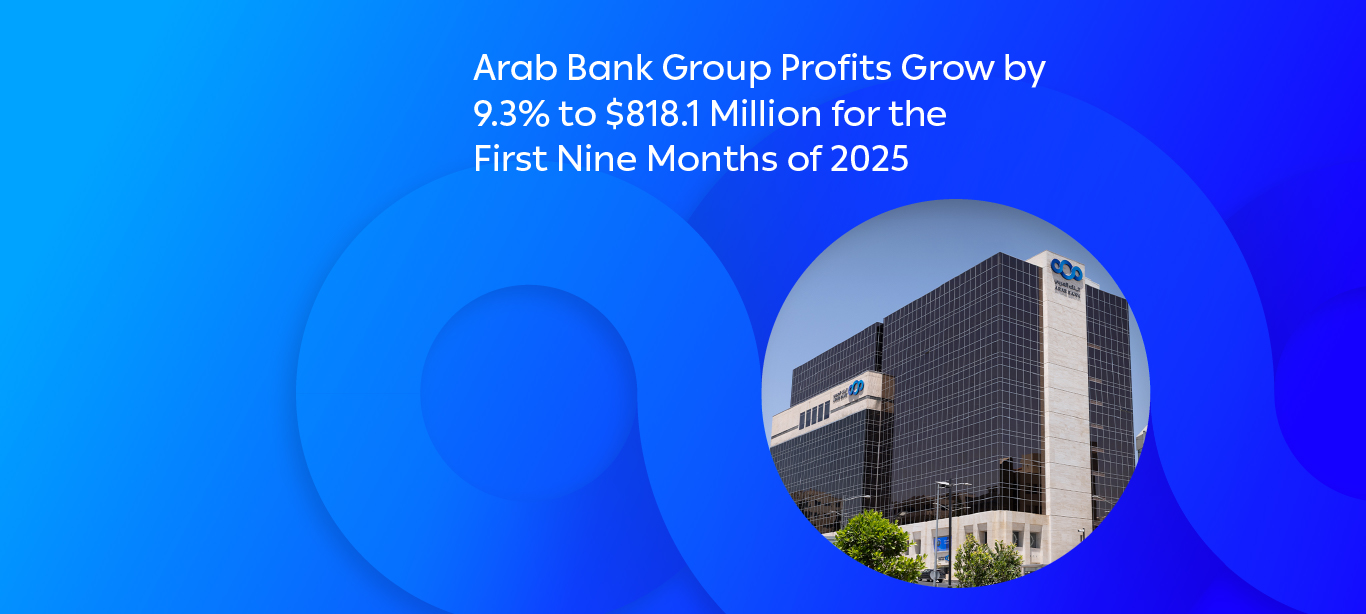Protecting Your Information
At Arab Bank, keeping your personal and financial information secure is our top priority. We are committed to maintaining secure effective methods when collecting, using and exchanging your information.
We deploy and maintain security controls and procedures that are constantly monitored and reviewed to ensure they are relevant and operating effectively. Our approach focuses on prevention, detection and correction at different channels.
We work continuously to ensure ongoing compliance with all central bank’s regulations and alignment with best practices (i. e. ISO/ ISMS, ITIL & COBIT) as applicable to the Bank’s business model, and to be PCI compliant where and as required.
How to Protect Yourself:
In addition to using strong authentication methods (below), please do not release information that could be used to compromise your account. Regardless of the type of information requested, you are advised to:
- Assess and determine the reasonableness of the request, and ask yourself how critical the requested information for the specific service.
- Verify the requestor’s identity by requesting precise information (e.g. last name, first name, department, direct manager name) and if you are unsure of anything, kindly contact us to inquire about the provided country contact information.
If you receive a suspicious e-mail or SMS message that appears to be from Arab Bank, please do the following:
- Do not respond to the message or click on any of its links.
- Report to the bank immediately via the phone number or e-mail that is specific to your country.
Arab Bank will never ask for your secure credentials (such as user name, password, PIN, One Time Password (OTP)).
Passwords and Authentication:
Protect your accounts and identity by securing your credentials (user ID & passwords) and authentication methods (e.g. token & one- time password(s) (OTP)). These are the ways systems verify that you are who you claim to be. If your password is compromised, a person knowing your credentials can have access to your account(s) (e.g. transfer funds).
Tip: Arab Bank’s online banking services support this security feature. Please consider using this security feature that generates a strong authentication method.
Use a strong password and token for optimal security. Call our Customer Care Center for more information.
DO:
- keep your computer or mobile device software updated.
- Download mobile apps from reputable sources
- Install and keep your anti-virus software up-to-date.
- Lock your computer or phone when not in use.
- Avoid installing applications from unknown sources.
- Avoid using public places Wi-Fi such as internet cafes or free wireless internet when accessing “Arabi Online” service.
- Use unique password and PIN for different services.
- Change your password and PIN frequently.
- Shop online with verified by Visa/MasterCard (3D Secure) features.
- Look for privacy and security policies when shopping online.
- Sign out of “Arabi Online Banking”, clear your cache and close your browser after completing your transactions.
DO NOT:
- Share your authentication credentials, bank cards or PIN (ATM or customer Care center).
- Write your password down.
- Use default passwords, names and dictionary words, even in different languages.
- Reveal your password, PIN, or one-time password (OTP) to ANYONE. Arab Bank will never ask you for this information.
- Grant permission to applications on your computer or mobile that do not state the reason for the permission.
- Leave your devices unattended.
- Open e-mail or (attachments/click on links) from senders you do not know.
- Respond to unsolicited e-mails or click a link that is in a suspicious e-mail or text message.
Create and Use Strong Passwords Only
Passwords should be strong so they are not easily guessed or cracked (i.e. at least (8) characters long, upper/lower case letters, and include numbers and special characters).
Tip: Use a pass-phrase to remember your password.
(e.g. The phrase: “Would you like 3 scoops of ice cream?” forms a strong password “Wul3$oIc?”).
Common attacks
Social Engineering
“Social Engineering” refers to the practice of manipulating people to circumvent security systems and conduct fraud. This technique involves obtaining information people would not normally reveal to strangers.
Social engineering can take a variety of forms (e.g. telephone, e-mail, written mail, fax or instant messaging).
Phishing
Phishing is a type of social engineering attack often used to steal user data, including login credentials and credit card numbers. It occurs when an attacker masquerades as a trusted entity.
Phishing messages can come from a growing number of sources, including: e-mails, phone calls, social media messages and text messages. Victims can often be tricked into clicking the malicious link, or opening the malicious attachment.
E-Mail and SMS Spoofing
“Spoofing ” is when an e-mail or SMS message appears to have originated from one source when it was actually sent from another.
For example:
A scammer contacts a company pretending to be a financial institution/vendor, claiming that their bank account number has changed, so that subsequent payments will then unknowingly be routed to a fraudulent account.
Identity Theft
Identity theft is a type of fraud where a thief uses your personal information, such as your national ID / social security number or bank account number, to open accounts or initiate transactions using your name. Criminals may approach you pretending that they are a representative of the bank. For this reason, please verify the identity of an individual or entity prior to responding, either verbal or electronic, to requests, for personal or banking related information.
Tips to Safeguard Your Information
- Only enter debit/credit card and personal information when it involves a transaction you initiate and only on websites you trust.
- Always use a secure website or authentic mobile application when submitting debit/credit card numbers, financial or personal information online.
- Update your phone number by notifying the bank as soon as you change it to ensure you receive instant notifications for any conducted transactions on your account(s).
- Regularly monitor your account activities to promptly detect fraudulent transactions.
- Avoid accessing your online banking services in open, public areas like internet cafes.
- Secure your mobile phone and immediately report to us if you lose it or suspect any unauthorized access.
- Shred all documents containing personal information, such as bank statements, unused checks and deposit slips.
Management of Information Obtained Electronically
Personal information received through electronic channels, including Arab Bank Website access, Internet Banking Services, electronic applications, or emails is safeguarded to ensure your privacy and protection. Information collected may be used to meet your banking needs, improve upon our products and services, measure the number of visitors to the different areas of the website, as well as identify opportunities that will enable us to better serve you.
Website Usage Tracking – Cookies
Upon accessing a Website, unique information may be stored temporarily on the computer you are using. Cookies are utilized for the purpose of identifying and tracking a computer's access to their site. Cookies do not gather information that identifies you personally, nor may they be used to gather information stored on your computer. Should you want to do so, you can prevent cookies from being set on your computer by making necessary adjustments that disallow cookies within your browser options.
Applicability of This Statement
- Arab Bank refers to Arab Bank plc and subsidiaries.
- Arab Bank plc comprises of Arab Bank branches worldwide.
- Arab Bank subsidiaries include the following:
- Europe Arab Bank plc – London
- Arab Bank Australia LTD – Sydney
- Arab Tunisian Bank - Tunis
- Islamic International Arab Bank plc – Amman
- Al Arabi Investment Group – Amman
- Arab National Leasing Company – Amman
Changes to This Statement
From time to time, it may be necessary for us to amend our Security Statement. The current version will be maintained on our Website.
Privacy
For more information on how we protect the privacy of your personal information or if you want to learn more about our privacy practices, please read our Privacy Statement section, or contact us.
To Contact us:
Customer Care Center:
Phone: 19100
+20235314800 from outside Egypt
email: callcenter@arabbank.com.eg
Corporate Business Center:
Phone: 15190
email: corporate.businesscenter@arabbank.com
 Egypt
Egypt
English






19d7abad-7dff-43b3-9838-ad6c9ae543ff.jpg?sfvrsn=495dd09f_1)


 Egypt
Egypt 

